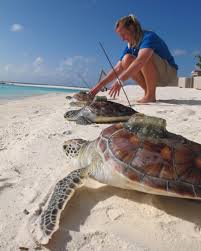Collecting turtle eggs is still legal and will remain so until at least 2015, according to government regulations, despite recent scientific reports stating that the population of the majority of turtle species is declining.
“We have a moratorium that will end at 2015, then we will look at other measures that we have to take,” explained Minister of Fisheries and Agriculture Dr Mohamed Shainee.
With turtle population numbers declining and some species at serious risk of complete extinction, organisations are working hard to protect turtles from further degradation at the hand of both humans and the environment.
The biggest threat to turtles, according to Sam Hope – Marine Discovery Centre Manager at Four Seasons Kuda Huraa – is egg collection and trade.
“There is a ban on catching and killing turtles in the Maldives, and that has been in places since June 1995, however, there isn’t a ban on egg collection,” stated Hope.
According to the fisheries regulations, the” catching, fishing, collecting or killing” of sea turtles is illegal across the entire country. The collection of sea turtles and eggs is also illegal say the regulations, but this is only applicable to 14 islands out of a possible 1,192.
The continuing secret slaughter of turtles was demonstrated last year after photographic evidence the practice emerged, showing dozens of dead sea turtles loaded onto a dhoni.
More recently, an article by Dr Agnese Mancini – an expert on turtle conservation – reported a decline in the population of the majority of turtle species found in the Maldives.
Published by the International Union for the Conservation of Nature (IUCN), the report established that while quantitative data on turtle numbers is scattered, the data collected recently from the entire Indian Ocean indicates negative trends in population numbers for all of the species, barring the Olive Ridley species.
Despite these findings, the laws governing the collection of turtle eggs remains the same and will do until at least 2015, stated Dr Shainee.
“Before that we will start planning for the next steps, and increasing our understanding – we will try and get stakeholders on board,” he said.
When asked if he thought the ban on egg collection should cover all islands of the Maldives, Shainee said that all islands would be protected, but that efforts needed to be focused.
“The rest of the islands we will do, but if they are not nesting islands there’s no point in unnecessarily restricting. For those areas that we know, we want to protect.”
Conservation efforts
Protecting endangered sea turtles is vital given the environmental pressures the Maldives already faces – pressures which themselves amplify threats to turtles.
In response to some of these threats, Four Seasons has teamed up with local environmental agency Seamarc to implement a number of valuable conservation programmes across the Maldives – based from their two on-site Marine Discovery Centres.
Among the pair’s successful projects is the ‘Head Start’ programme run from the Kuda Huraa resort – a fledgling project which has shown great potential to help increase the local turtle population.
The likelihood of turtle hatchlings surviving is estimated to be around 150:1, and so marine biologists have been hand-rearing a select few young turtles at the Marine Conservation Centre in order to give them a greater chance of survival.
“Where we do get a hatchling nest, we allow all of them to run down to the sea – because that’s very important for their development – but when they reach the sea we collect just two for our Head Start programme,” explained Hope.

“The Head Start programme is aiming to provide a safe environment so those turtles can go through the early stages of development and avoid those early stages of danger.”
“Because turtles have got a pretty rough deal- anything from ants to rats, cats, seabirds, fish and sharks- its really tough when you’re only 4-5 inches long with no defence techniques at all -apart from looking incredibly cute.”
“So we bring them back here, place them into our pools where we do a weekly check up where we weigh and measure them. The weight is very important to their health, and we’re working hard to understand the sea turtle dietary requirements,” Hope continued.
“When the Head Start gets to 18cm – which takes about 13 months – we put a satellite tracker on their back and we send them out into the big blue. We download from the satellite every two days, and download the data into google maps.”
The tags are semi-permanent, meaning the researchers can see how far the turtles have travelled for up to 10 months.
To date, the Head Start programme has reared and released 37 turtles, with 16 tagged for satellite tracking.
There are a number of resorts which are contributing valuable work to environmental conservation, but in order to push this movement to the next level, Hope notes that the links between resorts and local communities need to be stronger.
“There needs to be more trust between resorts and local communities” he states. “What would really benefit the movement is a bottom up management, led by a greater amount of community work and community led projects.”
Regarding the laws against turtle egg collection, Hope said that it was unlikely all islands are being used for turtle nesting, but admitted there was a dearth of local knowledge which Seamarc was attempting to address with local surveys and community assessments.
“Turtles sometimes switch nesting beaches if the beach condition becomes degraded which means that they may start using unprotected islands in the future if they are not already. Before we can decide on scientific policy we require scientific fact on which we can base decisions.”
“It is our hope that our work will shed more light on the extent of turtle nesting activities in order to further protect these endangered species.”